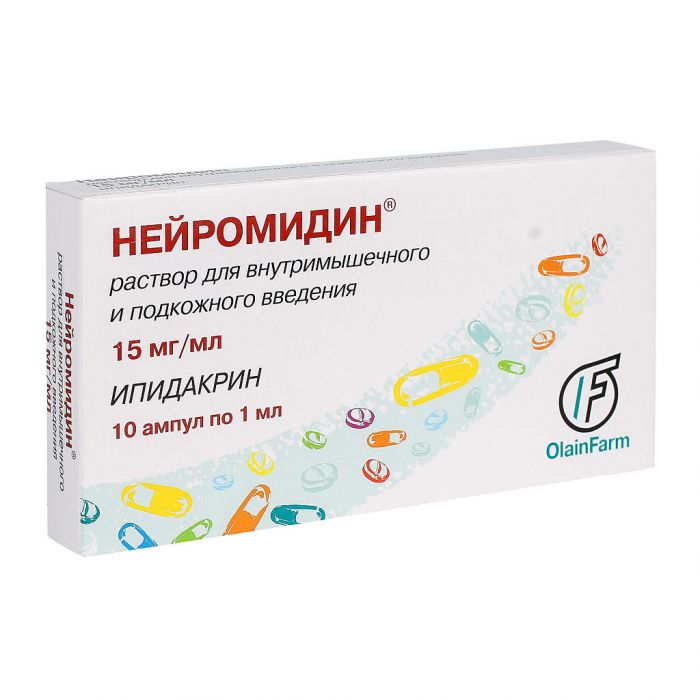ipidacrine | Neuromidine ampoules 15 mg / ml 1 ml, 10 pcs.
Special Price
$54.88
Regular Price
$63.00
In stock
SKU
BID463568
Packing
10 ampoules of 1 ml.
Pharmacological action of
Neuromidin® has a direct stimulating effect on the conduction of impulse along nerve fibers, interneuronal and neuromuscular synapses of the central nervous system and peripheral nervous system. The pharmacological action of Neuromidin® is based on a combination of two mechanisms of action: blockade of potassium channels of the membrane of neurons and muscle cells, reversible inhibition of cholinesterase in synapses.
Neuromidin® enhances the action on smooth muscles not only of acetylcholine, but also of adrenaline, serotonin, histamine and oxytocin.
Neuromidin® has the following pharmacological effects:
- improves and stimulates the conduction of an impulse in the nervous system and neuromuscular transmission
- enhances contractility of smooth muscle organs under the influence of acetylcholine, adrenaline, serotonin, histamine and oxytocin receptors agonists, improves memory, inhibits the progressive course of dementia.
In preclinical studies, Neuromidin® did not show teratogenic, embryotoxic, mutagenic, carcinogenic and immunotoxic effects, did not affect the endocrine system.
Pharmacokinetics
After oral administration, intramuscular and subcutaneous administration is rapidly absorbed. Cmax in blood plasma is reached 1 hour after ingestion and 25-30 minutes after i / m or subcutaneous administration. Binding to plasma proteins - 40-50% of the active substance. It quickly enters the tissue, the half-life is 40 minutes. Metabolized in the liver. It is excreted through the kidneys (mainly by tubular secretion and only 1/3 by glomerular filtration) and extrarenal (via the gastrointestinal tract). T1 / 2 of Neuromidin® for parenteral administration is 2-3 hours. After parenteral administration, 34.8% of the dose is excreted unchanged in the urine.
Indications of
diseases of the peripheral nervous system (mono-and polyneuropathy, polyradiculopathy, myasthenia gravis and myasthenic syndrome of various etiologies)
diseases of the central nervous system (bulbar palsy and paresis, recovery period of organic lesions of the central nervous system, accompanied by motor and / or cognitive doppler69 peripheral nervous system (mono- and polyneuropathy, polyradiculopathy, myasthenia gravis and myasthenic syndrome of various etiologies)
diseases of the central nervous system (bulbar paralysis and paresis recovery period of organic CNS lesions, accompanied by motor and / or cognitive impairment)
Contraindications
hypersensitivity to any component of the drug
epilepsy
extrapyramidal diseases with hyperkinesis
angina
bradycardia
asthma
mechanical ileus or urinary tract
vestibular disorders
gastric ulcer or duodenal ulcer in the acute stage
pregnancy (drug increases uterine tone)
lactation period
children under 18 years of age (there is no systematic data on application).
Caution: with peptic ulcer of the stomach and duodenum, thyrotoxicosis, CCC diseases, as well as patients with obstructive respiratory diseases in the anamnesis or with acute respiratory diseases.
Use during pregnancy and lactation
Contraindicated in pregnancy. At the time of treatment should stop breastfeeding.
Special instructions
There are no systematic data on the use of the drug NeuromidinВ® in children.
Alcohol should be excluded during treatment (enhances the side effects of the drug).
Influence on the ability to drive a car or perform work that requires an increased speed of physical and mental reactions. During treatment, one should refrain from driving a car, as well as engaging in potentially hazardous activities that require an increased concentration of attention and speed of psychomotor reactions.
Dosage and administration of
Diseases of the peripheral nervous system:
- mono-and polyneuropathies of various origins - s / c or IM 5-15 mg 1-2 times a day, course - 10-15 days (in severe cases - up to 30 days), further treatment is continued with the tablet form of the
preparation - myasthenia gravis and myasthenic syndrome - s / c or i / m 15-30 mg 1-3 times a day with further switching to tablet form. The general course of treatment is 1-2 months. If necessary, treatment can be repeated several times with a break between courses of 1-2 months.
Diseases of the central nervous system:
- bulbar paralysis and paresis - subcutaneous or i / m 5-15 mg 1-2 times a day for 10-15 days, if possible, switch to the tablet form
- rehabilitation with organic central nervous system lesions - in / m 10-15 mg 1-2 times a day, course - up to 15 days, then, if possible, switch to a tablet form.
If the next dose was not taken on time, then it is not additionally taken.
The maximum daily dose is 200 mg.
Side effects
Caused by the excitation of m-cholinergic receptors: salivation, increased sweating, palpitations, nausea, diarrhea, jaundice, bradycardia, epigastric pain, increased secretion of bronchial secretions, bronchospasm, convulsions. Salivation and bradycardia can be reduced with m-anticholinergic drugs (atropine, etc.). Increased uterine tone, skin allergic reactions.
Rarely (after applying higher doses) dizziness, headache, chest pain, vomiting, general weakness, drowsiness, skin reactions (itching, rash) were observed. In these cases, reduce the dose or shortly (1-2 days) interrupt the drug. These side effects are observed in less than 10% of patients.
Drug Interactions
Neuromidine® enhances sedation in combination with CNS depressants.
Effects and side effects are enhanced when used together with other cholinesterase inhibitors and m-cholinomimetic agents. In patients with myasthenia gravis, the risk of developing a cholinergic crisis increases if Neuromidin® is used simultaneously with other cholinergic agents.
The risk of developing bradycardia increases if -adrenoblockers were used prior to treatment with Neuromidin®.
Neuromidin® can be used in combination with nootropic drugs.
Alcohol enhances the side effects of the drug.
Reduces the inhibitory effect on neuromuscular transmission and conduction of local anesthetics, aminoglycosides, potassium chloride along the peripheral nerves.
Overdose
Symptoms: appetite, bronchospasm, lacrimation, increased sweating, narrowing of pupils, nystagmus, intestinal peristalsis, spontaneous defecation and urination, vomiting, jaundice, jaundice, jaundice , fear, ataxia, convulsions, coma, speech disorders, drowsiness, general weakness.
Treatment: in case of overdose of tablets - gastric lavage. The purpose of m-cholinolytics, incl. atropine, cyclodol, methacin, etc. symptomatic therapy.
Storage conditions
5 years.
active substance
ipidacrine
Pharmacy terms
Prescription
lekarstvennaja form
Solution for
Write Your Own Review

